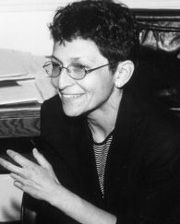Hello! The Cornish Music Series, always a prime locus for contemporary music in Seattle, got a shot in the arm this past season with the arrival of composer Laura Kaminsky, overseeing 100 students and 20 faculty as the new chair of Cornish’s music department. A graduate of Oberlin and the City College of New York, Kaminsky’s administrative experience has taken her not only across America, but to posts in Ghana and Poland. Expansion and inclusiveness in every direction is Kaminsky’s goal. A “Piano Pairings” series last spring brought together students, faculty, alumni, and guest musicians for concerts of classical, jazz, and world music—and, most interestingly, the areas where these genres overlap. A four-day festival of African music combined traditional and concert works with panel discussions, a film screening, field research, and master classes. A recent concert with her ensemble Musicians Accord and Brazilian musician Jovino Santos Neto, in conjunction with Jack Straw Studios, also included community outreach and a Web broadcast. This season, look for more collaborations with Seattle organizations as Cornish brings visiting artists for master classes: the Colorado String Quartet, performing in Meany Hall’s chamber music series, and soprano Harolyn Blackwell, here for a Seattle Opera gig. The American Music Center, on the board of which Kaminsky serves, will address real-world concerns in a daylong conference on “Business Basics for Composers” and “Concert Production for New Music” (11/12). Perhaps most emblematic of Kaminsky’s energetic arrival is the renovation, acoustically and visually, of Cornish’s marvelously intimate if somewhat drab PONCHO recital hall, a gradual process (though the space will be usable all season) scheduled for completion next April.
Goodbye! Christian Asplund arrived in Seattle as a UW graduate student in 1993 and soon after founded, with colleague Tom Baker, Seattle Experimental Opera (SEXO) to showcase a series of intimate and unsettling anti-operas written with his wife, poet Lara Candland. Their subjects were wildly disparate, but their delicate verbal imagery coupled with Asplund’s understated and insinuating music (he likes to “give the text a flat surface to bounce off of”) puzzled and charmed theatergoers: A Girl’s Body at Crepuscule, exploring a woman’s shifting sense of identity; The Open Curtain, reflections on the life and writings of Joseph Smith; The Archivist, the most inscrutable of them all, about a data collector in an underground bunker; Floralesque, an epistolary opera set in a conservatory; and, this July, Liquid Girls, with lots of fanciful water imagery in the text and real water providing beguiling sounds in the pit. Asplund also made a splash (ooh, nice segue!) on Seattle’s improv circuit, switching from quaint harmonium to edgy, thrashing viola, and started the thriving Seattle Composers’ Salon, a new-music open-mike night the last Friday of each month. But from academia he came and to academia he has returned. Asplund moved to Norman, Oklahoma, in August to head the composition department at the University of O







